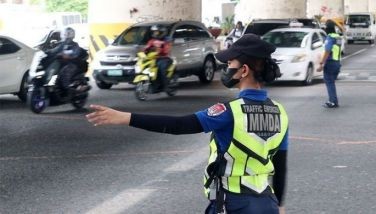Political risk: Lessons from Thailand

There was a time when Thailand and the Philippines were considered the Asean twins. Their demographics were comparable with just about the same number of people. Their level of economic development was just about the same as was the oligarchic nature of their economies. We had a more stable democratically elected government in place while they had a unifying King but military coups constantly destabilized their government.
We may have had some advantages over Thailand at the start. But the Thais pushed forward and left the Philippines behind. They attracted more foreign investors even if their investment incentives laws were just patterned after ours. Their agricultural sector boomed even if many of their agriculturists only learned their technology in Los Baños. Soon patis made in Thailand was finding its way to Filipino stores here and abroad.
Coups started going out of fashion in Thailand as we were discovering the thrill of instant gratification in changing regimes through People Power. While they focused on the economy, we were focused on politics.
They controlled their population growth rate while we allowed ours to get out of hand. Their currency, the baht zoomed ahead of the peso in value against the dollar. Their economy grew at a pace that would remind us of China today.
In our case, the years of the Marcos dictatorship caused the economy to flounder even as political cronies prospered. The People Power revolution may have reintroduced our type of democracy but the low moral quality of our leaders continued to fail us.
Our economy barely moved ahead of population growth resulting in rising numbers of poor and hungry people in our midst. We were not too affected by world and regional economic crises over the past few decades but neither were we able to enjoy the prosperity that came and went during the period.
But today, it seems that the Thais and the Pinoys are in the same boat again. While the Thais can still depend on the momentum of their past economic growth, their future seems less inspiring because of serious political risk.
On the surface what is happening can be blamed to a charismatic former prime minister who was overthrown for corruption and cronyism. But in reality a social upheaval may be in the making that is complicated by a sickly and aging King whose stabilizing influence will be sorely missed with the passing of his age.
The Financial Times last week reported that “Thailand’s political turmoil had come at a high price, with foreign direct investment tumbling in the short term.” Though FDI still trickles in, the FT notes that “the fall was steep… In the first 11 months of 2009, FDI were down 43 percent on the same 2008 period.
The slide in Thailand’s FDI was greater than Vietnam’s full-year fall of 13 percent or Indonesia’s 28-percent drop.” Our FDI by comparison rose in percentage terms as of October 2009 by 17.9 percent but the value is only $1.32 billion. Even with the large decline in Thailand, their FDI that came in was valued at $7.7 billion.
Investor sentiment in Thailand took a dramatic turn for the worse following the December 2008 takeover of the Bangkok’s International Airport by protestors. Upheavals in the past didn’t affect business sentiment too much but that changed when thousands of tourists and businessmen were trapped in the country and air export routes became unavailable. The Bank of Thailand, according to the FT, estimated that the siege cost some $8.5 billion.
Thailand’s Central Bank Governor, according to the FT, lays the blame clearly on political turmoil. “The biggest problem is the political situation,” she says. “With that neither the private nor the public sector can really focus on what needs to be done.”
The FT continues its report: “Private investment growing at 12 percent a year earlier in the decade, has ground to a halt, she says. Bank lending to businesses languishes at two third of 1990s levels, while the economy has become far more dependent on exports that it was before the 1997 crisis.”
And so analysts, according to the FT, are saying the problem is not so much that Thailand’s allure has declined in absolute terms, though it has, but that it has declined so much relative to rivals. Because it is geographically in one of the world’s most economically competitive region, Thailand is feeling the economic pain of its political problems.
Political analysts, the FT says, are predicting that street demonstrations could erupt into even worse violence when the six-decade reign of King Bhumibol Adulyadej comes to an end. Of the king’s protracted illness and fears of what might happen when his mediating presence is gone, the FT quotes this observation from the current Prime Minister Abhisit: “When you have had a very strong, inspirational leader for six decades, there is always going to be a sense of anxiety about change.”
There are those who observe that long term investors in both countries are immune to the dangers of political risk. That is not necessarily true. Even long term investors are nervously watching political developments in both countries and are probably even now drafting their Plan Bs.
Long term investors also worry about the very real risks to their investments imbedded in factories and marketing networks. As we have seen happen in the Philippines, the Intels of this world would not hesitate to pull out an entire factory if they are unhappy or unwilling to take the inherent political and governance risks of being in a country.
This is why it is very important for our judicial system to be seen as largely impartial and professional. It is their only guarantee that the contractual rights of investors can be protected by laws whose interpretation does not depend on the whims of a local power elite. A Supreme Court seen as largely under the control of someone like Ate Glue personality increases the political risk premium for all investors.
The biggest damage Ate Glue has inflicted on our country may not be her failure to curb corruption but the manner by which she has corrupted constitutional institutions meant for checks and balance like the Ombudsman, the Judicial and Bar Council and probably soon (but hopefully not) the Supreme Court.
The current lesson from the Asean twins: political stability matters to investors. The earlier our politicians get this message, the better it will be for the country.
SSS and GSIS
What is this I hear that the government managed pension funds are requiring those applying to get their retirement pensions to submit even a photo copy of their first pay slip?
This is absolutely ridiculous. I am a pack rat myself and my wife despairs every time she sees all the old files I keep. But I am sure I do not have the first pay slip I got from pre martial law ABS-CBN over 40 years ago. Such stupid requirements only make people feel that the pension funds are only making it difficult for members to get benefits because they have been mismanaged and do not have enough funds.
Two woodpeckers
Sonny Mendoza sent in this classic with a Tiger twist.
An American woodpecker and a Canadian woodpecker were in America arguing about which country had the toughest trees. The American woodpecker claimed America had a tree that no woodpecker could peck.
The Canadian woodpecker accepted his challenge and promptly pecked a hole in the tree with no problem. The American woodpecker was amazed.
The Canadian woodpecker then challenged the American woodpecker to peck a tree in Canada that was absolutely ‘impeccable’ (a term frequently used by woodpeckers). The American woodpecker expressed confidence that he could do it and accepted the challenge.
The two of them flew to Canada where the American woodpecker successfully pecked the so-called ‘impeccable’ tree almost without breaking a sweat.
Both woodpeckers were now terribly confused. How is it that the Canadian woodpecker was able to peck the American tree, and the American woodpecker was able to peck the Canadian tree, yet neither was able to peck the tree in their own country?
After much woodpecker pondering, they both came to the same conclusion:
Apparently, Tiger Woods was right when he said: your pecker gets harder when you’re away from home.
* * *
Boo Chanco’s e-mail address is [email protected]. This and some past columns can also be viewed at www.boochanco.com
- Latest
- Trending


























